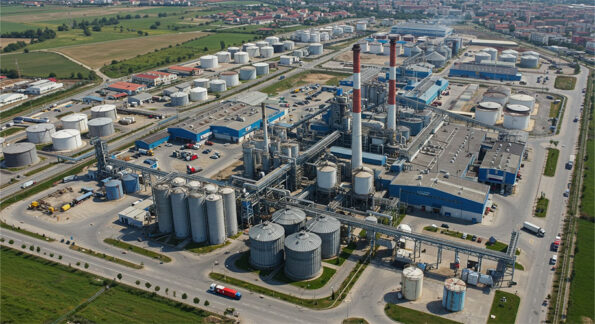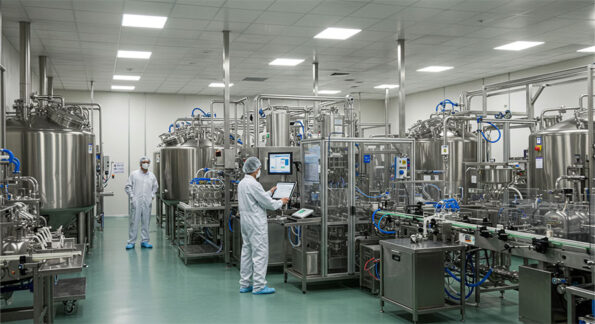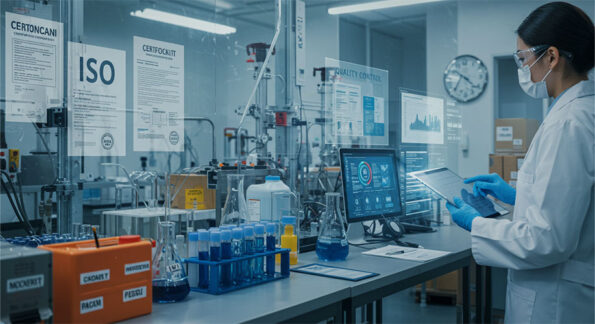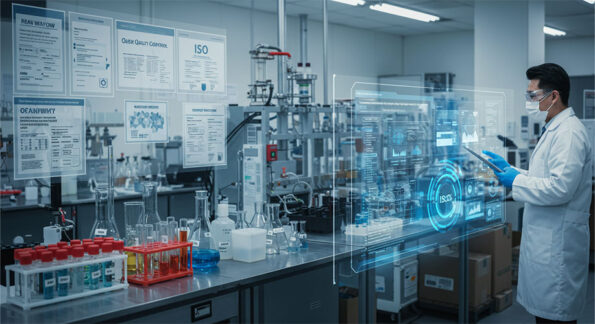Establishing a machinery and chemical products factory offers great opportunities for entrepreneurs who aim for growth and sustainable profitability in the industry. Today, chemical substance production facility investments are quite popular due to both increasing demand in the domestic market and export potential. In countries with strong industrial infrastructure like Turkey, establishing a machinery and chemical products factory provides serious advantages not only in terms of production but also in terms of branding. 🏭
A chemical products factory caters to a wide range of sectors, from cleaning to textiles, agriculture to automotive. This offers entrepreneurs the opportunity to diversify and provide flexibility in the market. However, such an investment requires not only capital, but also technical knowledge, regulatory compliance and long-term planning. Especially in the establishment of a chemical substance production facility, environmental permits, emission controls and occupational safety standards are of vital importance. 📋
Machinery, which is the heart of the production process, is one of the most critical building blocks of the project. Making the right choices in industrial type machinery production ensures the efficient operation of the facility and reduces maintenance costs. Modern facilities where automation systems are integrated provide high quality and sustainable production by minimizing human error. For this reason, it is very beneficial for those who want to establish a machinery and chemical products factory to receive expert consultancy when determining the machinery park.

For investors, chemical products factory is an attractive area in terms of circular economy, sustainability and high profit margin. This type of factory contributes to increasing domestic production while also having the potential to reduce the current deficit by reducing chemical product imports. 🌱 For those who want to establish a chemical products factory, the right strategy, a strong business plan and a long-term growth vision will be the most solid foundation on the road to success.
İçindekiler
ToggleFirst Step in Factory Establishment: Feasibility and Industry Analysis
Every successful investment starts with a solid analysis. The first step for entrepreneurs who want to establish a chemical products factory is to conduct a detailed feasibility and industry analysis. This analysis should cover not only the investment cost, but also the demand balance in the market, the level of competition and legal obligations. Steps taken without proper analysis may result in loss of time and capital. 🧭
First, the market place of the chemical products to be produced should be examined, and it should be determined whether these products are domestic or imported. For an investor who wants to establish a chemical substance production facility, this information plays a major role in determining competition and pricing strategy. At the same time, which chemical products offer higher profit margins should also be evaluated. This information provides basic data that will determine the product range of the facility.
Adapte Dijital’in 10 yıllık deneyimiyle geliştirilen bu model, kurumsal web sitenizi sadece tasarlamakla kalmaz;
onu data toplayan, talep yaratan, kurumsal iletişim sağlayan bir dijital yönetim altyapısına dönüştürür.
Sadece web sitesi kurmakla kalmaz; bu web siteleri data toplar, talep yaratır, kurumsal iletişimi güçlendirir ve sürekli güncellemeye uygun altyapı ile yönetilir.
Secondly, the region where the facility will be located should be examined. For those who want to establish a machinery and chemical products factory, choosing areas with ready infrastructure and incentives such as organized industrial zones (OSB) provides advantages in terms of cost and time. In addition, proximity to raw material resources and logistics networks in the region directly affects production efficiency. 🚛
As a result, correct analyses to be made during the chemical products factory installation process are the greatest guarantee of the longevity and sustainability of the investment. A customized plan according to both market demand and the investor’s capabilities increases competitiveness and reduces risks. The chemical sector is a dynamic area that offers great opportunities with specialization and the right steps. 📈
Target Market and Competition Research
Establishing a chemical products factory is not a step to be taken without understanding the market. Which products are in greater demand in the market, which companies operate in this field, and which pricing strategies are applied should be analyzed in detail. In this way, the investor focuses not only on production capacity but also on sales potential. 🧪
In target market analysis, attention should be paid to the distribution of both domestic and imported products in the market. Products with high import rates in particular offer significant opportunities for chemical substance production facility investment. Substituting imported products with domestic production can provide both cost advantage and government incentive. In addition, product groups with export potential can be identified and global market expansion plans can be created.
Competition research directly determines the positioning strategy. By analyzing the prices, quality levels, distribution channels and brand awareness of competing companies, differentiating factors for the newly established chemical products factory should be determined. These differences can be high purity, special formulation, lower cost or environmentally friendly production. Investors should transform this data into a strategy in order to become leaders in the market, not competitors. 🌐
Domestic and Imported Product Supply-Demand Balance
The first issue an investor who wants to establish a chemical products factory should evaluate should be whether the product they are targeting is domestic or imported. Some chemical raw materials and additives are mainly imported because they are produced in limited quantities in Turkey. This situation creates a great opportunity for domestic production. 🌍
Producing products that are particularly in high demand but dependent on imports provides additional benefits such as cost advantage, exchange rate independence and benefiting from government incentives. Good analysis of this balance shortens the return on investment period for entrepreneurs who want to establish a machinery and chemical products factory and allows them to enter the market faster.
Which Chemical Products Should You Invest In?
The choice of product to be produced is one of the most strategic decisions for a chemical products factory. Choosing the right product within a wide product range directly affects market success. The main criteria to be considered here are: demand volume, competition level, production difficulty level and legal regulations. 📊
Adapte Dijital’in 10 yıllık deneyimiyle geliştirdiği modellerle, kurumsal web sitenizi kurumunuzu/markanızı anlatan, tanıtan, güven yaratan, talep oluşturan bir dijital yönetim platformuna dönüştürür.
Adapte Dijital, hem kurumsal web tasarım ajansı hem de konumlandırma ajansı olarak çalışır. Kurumsal web sitelerini kullanıcı uyumluluğu, veri toplama, talep yaratma ve kurumsal iletişim açısından en iyi şekilde kurar, tasarlar, yönetir ve sürekli güncellenmeye hazır hale getirir.
For example, areas such as cleaning products, industrial solvents, agricultural chemicals or cosmetic raw materials require different levels of capital and expertise. Investors who will establish a chemical substance production facility should focus on areas in which they are experts, preventing production errors and inefficiencies. In addition, the ease of finding qualified personnel is another factor affecting product selection.

Installation Location and OSB Preference
Entrepreneurs who want to establish a chemical products factory should pay attention not only to the land price but also to all the elements that will affect the production process when determining the facility location. Where the factory will be located affects many areas, from production costs to marketing strategies. 🏭
Organized Industrial Zones (OSB) offer an ideal environment, especially for those who want to establish a machinery and chemical products factory. Ready infrastructure, low energy tariffs, treatment facility opportunities, incentive packages and local government support make these regions attractive. In addition, thanks to the clustering advantage in OIZs, supply chain and logistics processes are more easily managed.
OIZs are also advantageous in terms of environmental regulations. The treatment infrastructure provided by OIZs for environmentally sensitive facilities such as chemical substance production facilities facilitates license processes. In other words, the right location affects not only production but also the legal and environmental success of the investment.
OIZ Advantages and Incentives
Establishing a chemical products factory in OIZs both reduces costs and speeds up legal processes. In these regions, land allocation, infrastructure connections and construction permits are supported by central administrations. The state offers many incentives such as VAT exemptions, tax reductions, and interest support for investments in OIZs. 💸
In addition, companies located in OIZs can benefit from common areas and support centers. This creates cost advantages in areas such as R&D, quality control and environmental management. Therefore, choosing OSB is not only an economic but also a strategic choice.
Logistics and Access to Raw Materials
For a chemical products factory, proximity to the supply chain is as important as location. Accessing raw materials quickly and affordably ensures production continuity. At the same time, proximity to transportation arteries such as ports, highways and railways directly affects the distribution time and cost of products. 🚚
Especially entrepreneurs who will establish a chemical substance production facility should analyze whether they will provide raw materials from domestic producers or through imports. For those who want to establish a machinery and chemical products factory, logistics planning is a hidden power that increases business profitability.
Machinery and Plant Infrastructure: Establishing the Heart of Production
When establishing a chemical products factory, infrastructure planning determines the fate of the investment. The performance, production capacity and energy efficiency of the factory are directly dependent on the infrastructure. Therefore, the most strategic step to be taken by those who want to establish a machinery and chemical products factory is to create the right machinery park. A modern chemical substance production facility requires not only production; but also safety, environmental compliance and digital management capability. ⚙️
Correct decisions regarding industrial machinery production guarantee sustainable profitability in the long term. In particular, the selection of domestic or imported components such as mixers, reactors, filling machines and storage systems used in chemical production should be made carefully. Investors who want to establish a chemical products factory should focus not only on the machine price; but also on energy consumption, maintenance costs and spare parts access. These factors determine the total cost of ownership of the facility. 💡
The correct placement of installation systems and process lines to be used in the installation of a chemical substance production facility increases both production efficiency and occupational safety. In addition, machines used in production involving hazardous substances must comply with international standards such as ATEX directives. This is where automation and digital monitoring systems come into play. Each production unit of the factory must be remotely monitored and optimized. In this way, the waste rate is reduced and efficiency is increased. 🔍
In conclusion, establishing infrastructure for a chemical products factory does not only mean physical construction; it is also the process of integrating technical planning, engineering details and advanced digital systems. The right machine park determines the pulse of not only the production line but the entire factory. 🏭 For entrepreneurs who want to establish a machinery and chemical products factory, this stage is the most fundamental and irreversible part of the business.

Criteria in Industrial Machinery Selection
Establishing a chemical products factory starts with the right machines. The efficient operation of the factory is directly dependent on the industrial machinery production selections to be used in the production process. These machines must be suitable for production volume, product variety and chemical properties of the raw material. The machines to be selected for the chemical substance production facility must be resistant to high heat, pressure and chemical reactions. Otherwise, both work safety will be at risk and production quality will decrease. ⚠️
One of the most important criteria to consider when choosing a machine is having the appropriate technology. New generation production lines are much faster, safer and more energy efficient than manual systems. In addition, systems with low maintenance costs and easy access to spare parts should be preferred. This provides a great cost advantage in the long term for entrepreneurs who want to establish a chemical products factory.
In addition, it is of great importance that the machines can be integrated into automation systems. In particular, for those who want to establish a machinery and chemical products factory to be able to invest in the future, it has become a necessity for production lines to be Industry 4.0 compatible. In addition to the capacity of the machines, safety sensors, energy consumption monitors and data collection modules should also be evaluated. All these criteria ensure that chemical products factory investments are built on solid foundations. 🏗️
Domestic Production Machines or Imported?
“Domestic or imported?” is a question that worries every investor. The answer that those who want to establish a chemical products factory will give to this question makes a big difference in terms of both cost and efficiency. Domestic machines can be more cost-effective in the initial stages of the establish a machinery and chemical products factory process. At the same time, working with domestic manufacturers in spare parts, technical service and maintenance processes saves time and money. 🇹🇷
However, imported machines generally stand out with their technological superiority, precision and high level of automation. Especially in businesses that involve sensitive chemical processes such as chemical substance production facilities, some imported machines can offer safer and more precise solutions. Therefore, product type, production volume and investment budget should be taken into consideration when making a decision. When both options are analyzed carefully, the right combination can be created for chemical products factory. ⚙️
Energy Consumption and Efficiency Calculations
Energy consumption is one of the biggest operating expenses of a factory. Therefore, in the industrial type machinery production process, the efficiency per kilowatt of the machines, maintenance periods and operating times should be carefully analyzed. Especially in energy-intensive productions such as chemical substance production facilities, systems with an efficiency rate of 90% and above should be preferred when selecting machinery. 🔋
At this point, machines that work integrated with energy monitoring systems come to the fore. Thanks to these systems, real-time consumption data can be monitored and unnecessary energy use can be prevented. At the same time, it is also possible to benefit from energy incentives and efficiency supports offered by the state. For those who want to establish a chemical products factory, these analyses directly affect the sustainability and environmental impacts of the investment. 🌱
Automation Systems and Production Efficiency
Today, the success of chemical products factory investments largely depends on the level of use of automation systems. In systems based on manual labor, the error rate is high, production speed is low, and traceability is poor. However, a chemical substance production facility working with automation integration can produce thousands of products with consistent quality in seconds. This ensures a quick return on investment. 🔁
Those who want to establish a machinery and chemical products factory should choose machines that are compatible with smart sensor technologies, PLC systems and data collection platforms. Thanks to these systems, operator errors are reduced, production processes are standardized and all processes can be monitored through a central system. At the same time, the data obtained during the production process is used for quality control, maintenance planning and efficiency increase. This provides a serious competitive advantage for the chemical products factory. 📊
Industry 4.0 Compatible Systems
Industry 4.0 transforms factories into not only production sites, but also digital information centers. In structures requiring high precision, such as chemical substance production facilities, this transformation provides a critical advantage. Thanks to data analytics, internet of things (IoT), robotic automation and artificial intelligence-supported systems, the entire production process can be monitored and optimized. 🤖
For investors who want to establish a chemical products factory, establishing infrastructures compatible with Industry 4.0 will help meet not only today’s but also future production needs. Thanks to these systems, error rates decrease, while quality and speed increase. For those who want to establish a machinery and chemical products factory, this transformation is no longer a choice, it is a necessity.
Remote Monitoring and Failure Notification Systems
One of the most critical elements in modern production facilities is the ability to monitor production remotely and instantly detect potential failures. Thanks to these systems developed in line with industrial type machinery production, any deviations or failures that may occur in the machines are automatically reported to the center. This also reduces downtime to a minimum. ⏱️
For chemical products factories, such systems both increase production safety and make it unnecessary for operators to be under constant control. In addition, thanks to these systems, maintenance processes are carried out in a planned and timely manner, and sudden stops are prevented. Those who want to establish a chemical products factory must definitely integrate this technology into their projects.
Legal and Environmental Processes When Establishing a Chemical Products Factory
Establishing a chemical products factory is not a process that is completed by simply purchasing the production infrastructure and machinery and starting production. One of the most difficult and critical stages that those who will manufacture in this field in particular face is legal permits and environmental regulations. No chemical substance production facility that does not comply with the environmental, health and safety standards valid in Turkey and the international market can start operating. 🌍
First of all, the Environmental Impact Assessment (EIA) process must be carried out for the chemical products factory to be established. In this process; the environmental impacts of the chemicals to be produced, waste management, air emissions and possible risk scenarios are reported. The construction of the facility cannot begin without a positive EIA decision. At the same time, different permits must be obtained from the local municipality, provincial environmental directorate, industry and technology directorates. Obtaining these permits on time and correctly is of great importance in order not to delay the production plan. 📄
Investors who want to establish a machinery and chemical products factory should definitely conduct the licensing process with an expert consulting firm in the field. Because the machines, pressure vessels, gas systems and automation infrastructures used in the installation of a chemical substance production facility require control and certification from different institutions. This necessitates that the process be managed from a technical and legal perspective.
In addition, the industrial type machinery production equipment to be used in the facilities must have international standards such as CE certificate and ATEX compliance. These documents are vital not only for production quality but also for occupational safety. It should not be forgotten that a chemical products factory should be a facility that protects the environment, ensures occupational safety and can produce without harming society. Care for legal and environmental processes is the basis for the longevity and sustainability of the factory. ✅

Environmental Impact Assessment (EIA) Process
Establishing a chemical products factory should be carried out with an environmentally sensitive and sustainable production approach. The first and most important legal step in this direction is to initiate the Environmental Impact Assessment (EIA) process. Especially for investors planning to establish a chemical substance production facility, this process is not only an obligation but also a document of the facility’s responsibility to nature and society. 🌱
The EIA report is prepared according to the field of activity, production capacity and geographical location of the factory to be established. The report details topics such as wastewater, gas emissions, chemical storage and transportation, and occupational safety measures. Chemical products factory should be designed to minimize potential damage to the environment and its documentation should be provided through the EIA process.
For entrepreneurs who want to establish a machinery and chemical products factory, being successful in this process is vital both in terms of not delaying the investment and progressing smoothly with public institutions. Investments made without a positive EIA decision may face sanctions up to and including heavy administrative fines and the closure of the facility. Therefore, anyone who wants to establish a chemical products factory should manage this process meticulously. ✅
Chemical Waste Management and Filtration Systems
A chemical products factory produces different types of solid, liquid and gaseous waste throughout the production process. Failure to manage these wastes properly can cause serious damage to both the environment and the business. Hazardous wastes, especially those produced by chemical substance production facilities, must be separated, stored and disposed of in accordance with environmental legislation. 🧪
Filtration systems are one of the most critical infrastructure elements of the factory at this point. High-capacity filters should be used to prevent gas emissions from mixing into the air, chemical waste from mixing into the soil or water. At the same time, these systems should be inspected regularly, maintenance plans should be created and their performance should be reported. These practices ensure that those who want to establish a chemical products factory make an investment that is both environmentally and legally friendly.
Obligation to Comply with Emission Standards
Establishing a chemical products factory is shaped not only by production targets but also by environmental responsibilities. In particular, the release of gases generated during the production process into the atmosphere must be controlled in accordance with emission standards. Facilities that emit emissions above the limits determined in Turkey and internationally face serious penalties. 🌫️
Therefore, when establishing a chemical substance production facility, appropriate filtering systems should be installed in all chimneys, gas measurement devices should be installed and values should be monitored with periodic tests. In addition, these measurements should be presented as documents during environmental inspections. It is recommended that those who want to establish a machinery and chemical products factory get support from professional environmental engineers at this point. Otherwise, licensing processes may be disrupted.
Licensing and Licensing Procedures
One of the most complex processes that entrepreneurs who want to establish a chemical products factory will face is licensing and licensing. This process is not limited to a construction permit from the municipality. Each stage, such as the production, storage, transportation and marketing of chemicals, requires a separate permit and inspection process. 📋
First, a business license appropriate for the business’s field of activity must be obtained. Then, environmental permits and licenses must be initiated from the Ministry of Environment, Urbanization and Climate Change of the Republic of Turkey for each chemical to be used within the scope of production. Chemical substance production facility activities are also subject to approval from different institutions such as the Ministry of Health and the Ministry of Industry and Technology. Therefore, the process of opening a chemical products factory has a multi-actor and multi-layered structure.
In addition, technical documents such as CE certificate, pressure vessel license and ATEX compliance must be obtained for the machines to be used. In facilities that use industrial type machinery production, having these documents complete is critical to avoiding problems in occupational safety and insurance processes.
Required Ministry and Institution Approvals
Establishing a machinery and chemical products factory requires simultaneous approval from many public institutions. During this process, it is necessary to work in coordination with institutions such as the Ministry of Environment, Ministry of Health, Ministry of Industry and Technology, municipalities and OSB managements. Since each institution’s document and permit processes work differently, time management should be planned very well. ⏳
In addition, if the business will produce in different sectors such as food, cosmetics, cleaning products, it will involve additional institutions such as the Ministry of Economy or the Ministry of Agriculture in the process. Therefore, those who want to establish a chemical products factory should definitely take these approvals and their durations into consideration in their business plans. Otherwise, the opening process of the facility may be delayed and costs may increase.
Chemical Product Classifications and Certification
Each chemical to be produced in a chemical products factory is subject to a special classification system. These classifications directly affect the packaging, transportation, labeling and sales processes of the products. A product that is classified incorrectly is both against the legislation and can lead to a loss of reputation in the market. 📦
Therefore, companies that establish chemical substance production facilities must work in accordance with GHS (Global Harmonized System) and CLP (Classification, Labeling and Packaging) regulations. In addition, the MSDS (Material Safety Data Sheet) documents of the products must be prepared completely and presented with the product. Entrepreneurs who want to establish a chemical products factory should definitely carry out these document processes with expert consultants.
Production Process, Personnel Management and Quality Control
Establishing a chemical products factory is not limited to just facility construction and machinery supply. Once production begins, efficient process management, qualified personnel employment and sustainable quality control systems are of vital importance. Especially in facilities that operate with high precision, such as chemical substance production facilities, process planning and quality control directly affect the success of the investment.
For investors who want to establish a machinery and chemical products factory, integrating production processes with digital systems both reduces human error and increases controllability. Every step of the production line should be traceable, and all steps from raw materials to final products should be recorded. This provides a critical advantage not only for internal quality processes, but also in terms of audits and customer trust. ⚙️
In addition, employee training and adaptation to the process should not be neglected. Periodic training of personnel working in high-risk environments such as chemical products factories increases safety and quality together. Quality control departments should have a structure that evaluates and documents not only product quality but also the entire production process.
Therefore, optimizing production processes, integrating quality standards and properly managing human resources should be the priority of anyone who wants to establish a chemical products factory. This approach increases competitiveness not only in the domestic market but also in exports.

Process Planning in Production Lines
An efficient chemical products factory does not work without planning. Production line planning refers to the detailed organization of the process from raw material input to the packaging of the final product. Especially in multi-stage production facilities such as chemical substance production facilities, processes need to be based on clear timelines and task definitions. ⏱️
Thanks to good process planning, waste rate decreases, production repetitions are minimized and machine working hours are used more efficiently. For this, digital production software, sensor-supported data collection systems and production scheduling software should be put into action. Especially in lines using industrial type machine production, synchronization between production capacity and personnel coordination should be ensured.
In addition, maintenance and cleaning plans should be integrated with the process calendar. Otherwise, unplanned stops will disrupt production and increase costs. In this context, for those who want to establish a machinery and chemical products factory, production planning is not only a technical but also a strategic decision.
How to Manage the Raw Material Supply Process?
A chemical products factory is as strong as its raw materials. The raw materials required for continuous production must be supplied on time, in the right quantity and in the right quality. Supply chain management is of great importance, especially for externally dependent chemical raw materials. 🧪
Therefore, entrepreneurs who want to establish a chemical products factory should establish strong relationships with both domestic and international suppliers. Contractual supply, inventory management software and creating alternative supply plans are critical measures to prevent production disruptions. In addition, incoming raw materials from suppliers should be regularly checked for quality and recorded.
Production Line Synchronization and Waste Management
The harmony of production lines allows those who want to establish a machinery and chemical products factory to achieve their productivity goals. When the synchrony between the machines on the line is disrupted, the waste rate increases, production slows down and costs increase. This directly affects product quality. ⚠️
Therefore, companies that establish chemical substance production facilities should ensure that all machines and stations on the line work in a way that supports each other. Waste at every stage of the production process should be analyzed, recurring errors should be identified and continuous improvement should be made. Waste management is important not only in terms of cost control but also environmental responsibility.
Quality Standards and Certifications
A chemical products factory cannot compete without a quality certificate. Production and certification in accordance with standards are essential for products to be accepted in national and international markets. This is important not only for customer trust, but also for export, participation in tenders and benefiting from state support. 📜
Especially for chemical substance production facilities, certificates such as ISO 9001 (quality management), ISO 14001 (environmental management) and GMP (Good Manufacturing Practices) are of critical importance. These certificates are not only documents, but also prove that the factory operates systematically and has continuous improvement processes.
The proper operation of quality processes ensures that those who want to establish a machinery and chemical products factory are prepared for both internal audits and customer demands. A quality system that is constantly monitored and documented increases the prestige of the facility.
ISO 9001, ISO 14001 and GMP Applications
One of the first steps that those who want to establish a chemical products factory should take is to integrate these three basic quality systems. While ISO 9001 shows that the production process is managed according to certain standards, ISO 14001 proves that environmental effects are kept under control. GMP is a system that documents that hygiene and safety standards are applied, especially in products that concern human health. 🧾
These documents play a major role not only in internal audits, but also in customer trust, dealer network establishment and acceptance in the global market. Especially in sensitive areas such as chemical substance production facilities, these certificates directly increase the value of the investment.
Product Feedback and Traceability Systems
A chemical products factory should have control over not only the production process but also the entire product life cycle. This means recording information such as production date, batch, test results and distribution process of the products. Thanks to these systems, customer feedback can be easily analyzed and possible product recalls can be acted upon quickly. 📦
Traceability is of great importance, especially for chemical products factories that produce for export. Establishing a traceability infrastructure that complies with international standards not only ensures legal compliance; it also increases customer satisfaction and loyalty. It is a critical step for those who want to establish a chemical products factory to integrate this system from day one.
You can get detailed information by watching our founder Gürbüz Özdem’s Digital Consulting and Digitalization video.
Adapte Dijital’s Success Stories: Meet Our References
With the comprehensive services offered by Adapte Dijital, you can take it to the next level in the digital world, expand your customer base and increase your brand awareness. Contact our expert team and turn your digital journey into a success!
Witness Adapte Digital’s success stories! Visit Our References page now to take a look at our projects that make a difference in the digital world and see how we ensure customer satisfaction. Take your place for a strong digital transformation!






